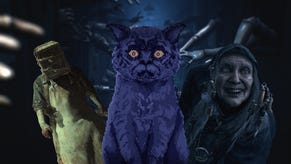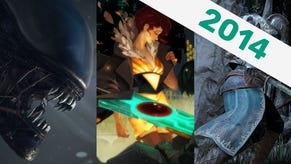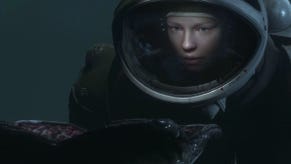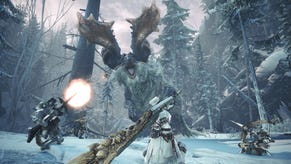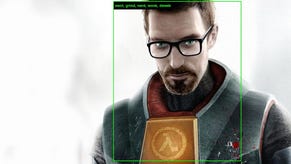The greatest horror game of 2014 - Alien: Isolation
Loving the alien
A game about Alien rather than a game about Aliens. A game about fleeing and hiding rather than running and gunning. A game that uses a license as effectively as any in the history of the medium. Alien: Isolation is a worthy successor to Ridley Scott's sci-fi horror classic.
Adam: We're not using the X word.
Has a game ever recreated the look and feel of a film as accurately as Alien: Isolation? If so, I haven't played it. Creative Assembly's FPS horror masterpiece isn't just a generous portion of stealth and scares, it's a superbly detailed trip into the world that Ridley Scott and his team brought to the screen three and a half decades ago. Everything from the creature itself to the individual posters and pieces of machinery that fill the Sevastopol has been crafted to fit with the design principles that made the Nostromo such a fascinating and enduring location.
This is a vision of a future populated by ordinary people - working Joes, you could call them - who just so happen to make their living as part of the crew of gargantuan spacefaring vessels and stations. These are the places that they live, love, work and die. We don't have to be told that existence is precarious when the only thing between you and the vacuum is some uncaring corporation's cut-price tech because we can see and hear the fragility of the situation in every bundle of loose wires, creaking panel and glitching console. There is no room for sleek starships here or crisp, pressed uniforms with neat little badges. The Sevastapol is a product of pragmatic industrial futurism and even before the parasite gets into its blood, everything is going to hell.
Isolation is a story about a horrific alien that seems to be made of knives, acid and a phallus tearing through the population of a science fiction facility. It is also the story of a woman who has lost her mother, searching for answers. And then again, it's the story of a corporate in decline, of power plays and the victims of financial competition. That it manages to tell all of those intertwined tales while also delivering one of the most tense and terrifying system-driven games of this or any other year is a remarkable achievement.
Despite all of that praise, there are frustrations. Isolation is an unforgiving game. Unfair even. The alien will kill you, again and again and again. Progress can be slow and sometimes altering your tactics and using every tool at your disposal will seem pointless. Luck plays a role and passing a particular section can seem like an exercise in trial and error. The odds are stacked against young Ripley and even a fine understanding of the behaviours at play won't be enough to prevent every single death.
That's the nature of the beast though and would the game feel like an authentic Alien experience if every encounter didn't come with the risk of a swift demise?
Almost everything I've written above is encapsulated neatly in one feature. The save points. The save points are the functional heart of Alien: Isolation
First of all, there's the visual design. Save points are emergency telephone consoles, with a chunky old fashioned handset hanging in place. A green light marks them out, calling Ripley from across dark rooms, telling you that this is the one safe place. To activate the save function, a key must be inserted, presumably as a sort of security measure, to stop people from calling in emergencies when they spill a cup of coffee or from accidentally causing a station-wide emergency by leaning on a button while taking a break. Like every other computer system in the game, operation is slow and it'd be no surprise to find you needed to reboot midway through an input.
Once the key is in place, lights tick down for a couple of seconds. Sometimes it feels like half a minute. This serves a dual purpose. First of all, if the alien is in the room, it'll kill you before you have a chance to save, ensuring that you're not left with a game that reloads just as a claw is about to rip your face off. That's handy. But the time it takes to secure your position is also a reminder that nothing can be taken for granted and that even when a device is helpful, it won't cooperate exactly as you'd like it to. You won't only die cowering in the confines of a locker - you'll die standing up with your salvation in your hands.
The flaw of the save system is that it encourages mad dashes from one to the next. Several times, I found myself ignoring my surroundings and my current objective, simply sprinting through a new area to locate the savepoint. I'd die as I frantically hunted for it, of course, but that didn't matter. A few seconds later, I'd restart at my previous location and start the search again. In the game's most difficult areas, I didn't even spare a second thought for the fictional situation because I was too concerned about playing the game and finding that next save point.
As soon as I managed to locate it, I'd be back in Ripley's shoes, hiding and hunting, but those out of body experiences as I panicked about preserving my progress were some of the only moments when my sense of belonging in the world collapsed.
Alien: Isolation's flaws are (on the whole) integral parts of its structure. You couldn't plaster over them without losing something valuable. Despite my criticisms, there's nothing I'd change, or at least nothing that I'd know how to change without fearing that something further down the line wouldn't be harmed.
The original film might well by my favourite piece of cinema - a genre flick with an atmosphere that nobody has been able to emulate - and Isolation is as good an adaptation/sequel as we're ever likely to see.
Back to the complete bestest best PC games of 2014.





